You started your career as a pop star in the late 50's. What moved you to switch to country music?
"Well, I started out in North Carolina listening to the Grand Ole Opry when I was a little boy. My grandfather was a hillbilly, he was a mountain man and he loved country music. When I was a little kid, I sat on his knee and played with his railroad watch and we listened to the Grand Ole Opry on the radio together. Back in the early 40's, that would be about 1942-43, my grandfather taught me to love the music and I started out dreaming of being in country music. But my first record came out in 1956 and it was a teen ballad. One of these songs about high school romance and teenage quarrels. It was a big hit in the pop field, n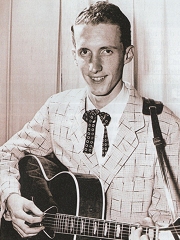 ot so much in country music. And all of sudden I had a manager and an agent and I was touring with Buddy Holly, Gene Vincent, Eddie Cochran and the Everly Brothers. They used to call us rockabillies. This had been in 56, 57, 1958. And they were all great people and I enjoyed doing all those tours but my heart was in Nashville. I wanted to be in Nashville. So I moved here in late 1959 and Chet Atkins signed me to a contract with RCA and the Grand Ole Opry invited me to become a member of the Opry that year. This is my 45th year at the Grand Ole Opry, 45 years! But I had always wanted to be a country singer and it is true that I switched from pop music to country but it was more of a temporary visit in pop music. I was just sort of biding my time. I was waiting for the opportunity to come where I wanted to be which was here on the Grand Ole Opry in Nashville. So I am very grateful and very happy to be a small part of the Opry, because it's the world's #1 country music show, the Mother Church of Country Music."
ot so much in country music. And all of sudden I had a manager and an agent and I was touring with Buddy Holly, Gene Vincent, Eddie Cochran and the Everly Brothers. They used to call us rockabillies. This had been in 56, 57, 1958. And they were all great people and I enjoyed doing all those tours but my heart was in Nashville. I wanted to be in Nashville. So I moved here in late 1959 and Chet Atkins signed me to a contract with RCA and the Grand Ole Opry invited me to become a member of the Opry that year. This is my 45th year at the Grand Ole Opry, 45 years! But I had always wanted to be a country singer and it is true that I switched from pop music to country but it was more of a temporary visit in pop music. I was just sort of biding my time. I was waiting for the opportunity to come where I wanted to be which was here on the Grand Ole Opry in Nashville. So I am very grateful and very happy to be a small part of the Opry, because it's the world's #1 country music show, the Mother Church of Country Music."
One of your current activities is hosting shows at the Grand Ole Opry. How do you feel to be a part of that big country music history?
"I am very grateful. I am 69. Radio stations don't play the older artists much because they want to reach the young audience. They want to appeal to the youth. And that's OK, I understand that because I used to be a young artist, too. But some of my friends who are at my age complain about how their records don't get played on the radio, they complain about how they don't get as much attention as the youngers. But I don't because I'm so grateful. I've had a 50-year career. This is my 50th year in country music. And I'm just glad to be walking around. Everyday when I get up and put my feet on the floor I say: "Thank you Lord, thank you dear Father for another day," because it's been wonderful 50 years. I'm not unhappy about anything because I know I am very lucky to be a small part of the Grand Ole Opry and to be able to sing on the stage where so many wonderful singers had sung. It's the joy of my life, really, is the Grand Ole Opry. I am very happy just to be one of the guests. I feel the Grand Ole Opry itself is the star. It's not the people only. The show is the star and the place. It's bigger than all of us. I guess the Grand Ole Opry would be like probably the Vatican or Rome would be to a Catholic. It's the holy place for country music singers. I'm just proud to be a part of it and be quite happy to stay there until I'll go to hillbilly heaven to see Jiří Brabec again which may not be very far off, never know..."
During your career you have done many kinds of music - pop, country music, gospel, bluegrass. What kind of music is your favorite? Where do you feel your roots are?
"Well, I heard Nanci Griffith once reffered herself as a folkabilly - part folk, part hillbilly. And I think that's where I'm at. I like folk music, I like songs that tell a story. I like songs that word pictures. Gordon Lightfoot, John D. Loudermilk has written a lot of songs for me. Tom T. Hall, Kris Kristofferson. I like songs that have a story to them. I never was much about honky tonk singer I got bored with all that blues, beer drinking songs, cheating and slipping around. There's so much more life in that. I guess you can call me a folkabilly. I like folk music very much and of course country music is a former folk music but I also like country gospel a lot because it tells a story, too but it also is about spiritual subjects and about eternal things. Things we all have to think about where we're gonna spend the eternity. I'm very fond of country gospel and folk style country music."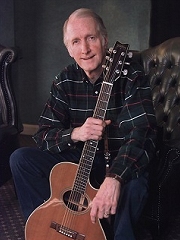
What is the hardest part of balancing a music career and a family?
"It's very difficult. My wife has spent a lot of time alone. She's had to raise the children because I was gone so much and I still am. So it's a double-edged sword. It's a wonderful life being able to sing and make music and meet friends all over the world, but it's not really very nice for the family because it's left behind a lot. That's the price you pay really for all traveling. Not just musicians and entertainers, but athletes and people who have jobs that mean they have to travel a lot. I think the wives and husbands who have to stay home and look after things deserve a lot of credit because it's very hard for them."
Do you mind if your fans approach you in public places?
"I don't mind at all. I'm always grateful when somebody recognizes me. I have a fairly ordinary face. A lot of people don't notice me, which is fine because I'm happy to be anonymous. But when people do recognize me, come up and ask for an autograph, it always makes you feel good because you think, well, somebody must be listening, somebody still cares. It's a great privilege to spend 50 years doing something that you love and it's really your hobby and the love of your life, it's not a job, it's not work. Sometimes people come up ask me when I'm gonna retire and I say: 'From what? I don't have a job. It isn't work, it's fun.' So I keep picking and grinning until the Lord calls me home. And that will suit me fine."
How did you get the idea to spread country music all around the world?
"I think it all started with Jiří Brabec. It was in Czechoslovakia, the visit to Prague, in March 1974. I had never been to Eastern Europe. The Iron Curtain was still in place then and the Russians were still in Prague. It was Cold War and it was strange times. So it was very hard for Jiří to get a permission for me to come. He invited me to come and sing with his band at the Sport's Hall in Prague. He was very kind of me and he introduced me to the people at Supraphon Records and we made an album together and we did some television shows together. And he came to Nashville many times to appear on the Grand Ole Opry. He had a lot of friends here at the Country Music Association. He was very kind of me and introduced me to Eastern Europe. And it was because of Jiří that I was in Eastern Europe in the spring of 1974, when the people at the American Embassy in Moscow heard I was in Prague. They invited me to come up to Moscow when we finish in Prague to do some concerts at the Moscow University for the students. So that is how really I got involved in international activities. The visit to Prague which led to the visit to Moscow. And then later I was invited to Warsava to Poland to do some recording and a television programme. They have a country music festival in Poland called the Country Piknik. It's in Mragowo. This has been going for many years. Jiří appeared at that festival. I would like to public they say that it was because of my dear friend Jiří and his family that I was able to come to Eastern Europe and that I was able to sort of develop an international music career. I miss Jiří Brabec very much and I loved him as a person. I'm so sad that he passed away. I believe he's in hillbilly heaven. My son wrote a song called "We Will Meet Again" about such things. That's how I feel. I feel that confidently we will meet Jiří again up there. I believe he's playing some hillbilly band up in heaven right now, I'm sure, with Hank Williams!"
When were you there last?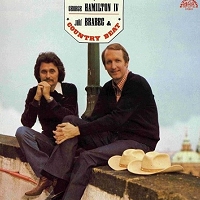
"The last time I was there it was very interesting. It's been several years ago now. I went to see Jiří and do a television programme and of course the Russians were gone. We came to the Czech Republic, no more Iron Curtain, and the people were free. Václav Havel, who had been in prison for many years, he was the new president, and things were going good. Václav Havel, by the way, he came to America as a special guest at the Moravian College in Pennsylvania, it's in Bethlehem, Pennsylvania, which was named after the Bethlehem Chapel in Prague. Václav Havel came there to speak at the Moravian College. He is a wonderful hero. When I went back to see Jiří and his television. He picked me up at the airport in a brand new car and he was talking on the cell phone, he didn't have these things from the Russians really. He said: "I have some great news for you, George." And I didn't know what this would be "What is this great news?" - "We now have three McDonald's in Prague!" That was the great news. And he was very excited about that because it meant, it was a symbol of the new era, freedom and all these wonderful things that may or may not be good for us."
Can you tell me something about your connection to the Moravian Church?
"Yes, I'm a member of the Moravian Church. It began in Moravia, Bohemia around Brno. The Moravians originally were the followers of Jan Hus. He was burnt at the stake in 1415. He was a reformer and he got in a bit of trouble with the church that time, because he felt that people should be able to pray direct to God and they should be able to have the Bible in their own language. I think that the Catholic Church that time were not very happy about him. Mister Hus was a rector at the Prague university and a minister at the Bethlehem Chapel. He was burnt at the stake for his beliefs and his faith. And his followers, the people who followed him and believed in him, many of them were from Moravia. They formed a group called The Unity of the Brethren. In Latin that would be Unitas Frantrum. In German it's Bruderkirche. And these people formed the religious society at church and eventually they were persecuted during the counter-reformation. The 30-years war, the battle of the White Mountain, many of them were killed and many of them left the country. Some went to Germany as refuges and people used to call them the Moravians, because they came from Moravia. That became the name of their group "The Moravians". Originally that was The Unity of the Brethern. Some of my ancestors came to America where was the group of Moravians. My ancestors were the Sctotish and the name Hamilton is from Scottland. But apparently some of my ancestors joined the Moravian Church in Scotland and came to America with the Moravians. Eventually they made it to North Carolina. My greatgrandfather, George Hamilton I, was a Moravian, the member of the Moravian Church. He had Scotish heritage but he belonged to the Moravian Church. I grew up in that church. Still today I do a lot of concerts at Moravian Churches and we always talk about the old country, about Moravia, Brno and I tell them about my visit with Jiří and how he took me to the Moravian Church in Prague. It was at 5 Halkova Street. And bishop Rudolf Ulrych was the pastor. That's my home church. It's a church that I belong to. I love it very much. So my connection is really with your country because the Moravian Church began in ancient Moravia, which is now the part of the Czech Republic."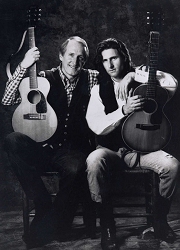
Does the number IV in your name represent a long tradition of George Hamiltons in your family?
"Yes, my greatgrandfather, my grandfather, my father were all Georges and when I was born, they were all still living so I guess it's for the social insurance, for the tax men, to keep everybody straight if your ancestor is still alive when you were born. They have to distinguish between you so they put a number on my birth ticket: "This is George Hamilton IV". I had never used the IV until I signed my first record contract where I signed the George Hamilton IV. And the man said : "Put your full name", and he starting laughing and he said: "That's a crazy name! George Hamilton IV! You want to be a country music singer with a name like that?" And then he said: "You know, I think I'm going to use that on a record because it's different." And I'm glad he did because a couple of years later I heard about a new movie actor named George Hamilton. So the number IV helps people know which one is which. I have a son named George Hamilton V. He's a singer and songwriter. He knew Jiří Brabec, too. Jiří Brabec and his daughter Lucy came to Nashville to do some filming for their television programme and I was away on tour so George V. took Jiří and Lucy around the town to interview people. He travels a lot in Eastern Europe and Poland, he's spent a lot in Germany. And believe or not he has a little boy, 5 years old, named George Hamilton VI. Don't ask me about the VII that'll be his problem." (laugh)
Do you still travel all around the world?
"Yeah, the funny thing about it is I'm busier now that I have ever been then. It's been a long time since I had a hit record or a song on the radio. It seems when you reach my age, maybe a lot of people start thinking like "Hey, better invite him to come sing for us because he may not be around for a long time." So it's funny. I get plenty of bookings. I get more invitations than I can even handle. It's another reason why I'm very happy. I don't feel left out or overlooked, because a lot of people still come up to concerts and my CD's still seem to be accepted by the people. I've done more in recent years. I've done a lot of country gospel work. As I've grown older and thought more about the serious side of life I've got more and more interested in spiritual music, gospel music. I do a lot of little churches where I just go by myself with no band, I take my guitar. And I always sing some Moravian hymnes for the people and I tell them about the Moravian Church where it was originated. It's a very muddy sort of exercise. There's no band, no big sound system, just by myself and the guitar. I enjoy that as much as anything because you're communicating very intimately close to the people."
Do you plan any trip to Europe?
"Well, I'm on my way to be there late this month (October 2005). I'll be in England and Scotland. They have a big country music festival in early November in Ayr, Scotland and I was invited there. They gave me permission to do a few small things done in England while I'm there. It won't compete with them, with the festival in Scotland. But I only will be able to be there for about a week late October, early November. I don't have any plans to come to Eastern Europe anytime soon. But my son does, he works a lot. Last year he recorded an album with a Polish country band and it was awarded the #1 album by the Polish Country Music Association. He's busier in Eastern Europe than I am. I don't know if he's been to the Czech Republic but I think he'd love to. He works a lot in Poland, and I think he's been to Hungary and Bulgaria. He travels more in Central and Eastern Europe now than I do. But there's maybe George VI, who will do. We don't know yet what's gonna happen to him. Things are going good and I'm very happy old guy."
Can you see any different approaches to country music in different countries?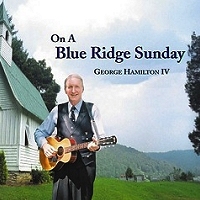
"Well, it seems to me that country music seems to be a Northern European phenomenom. I notice from the Czech Republic and Germany northward. It seems to be very popular in Norway, Sweden, Denmark, Switzerland, Poland, Scotland, Ireland, England, Wales. I'm not really sure about France. I think they like line dancing in France and it seems like they like rock'n'roll more in France. I think they like the country music that has a real strong beat to it. My impression is that this music has sort of sprang out of Northern European folk music. It came to America with the early immigrants. It seems to be so popular in Spain or Italy or Mediterranean countries. They have their own type of music. Mexico, South America, the Mariachis, the Mexican ballad singers. I think what we call Nashville type country music seems to be more popular in the Northern part of Europe. It's interesting. One thing I feel really good about is there's a lot of wonderful new talent coming along. Marty Stuart is great and all these young people who are writing new songs, singing and making new records. They appeal to young audience. That means that country music has a good future."
What are your plans in the future?
"Next year is my 50th anniversary in music business. This is the 80th year for the Grand Ole Opry this year. Next year there will be my 50th anniversary and I'm working on a new album of the 50th anniversary album called "Heritage and Legacy". And what I'm doing is going back and doing re-recording a lot of the old songs that I did when I was a young feller. But we're doing them in an acoustic style, more of a bluegrass acoustic style. Then we're gonna go right up to date and do some Bob Dylan songs and some of the newer material. I mentioned that George V has a song called "We Will Meet Again" and we're gonna do that one. That'll be sort of the 50th year collection , a 50-year musical scrapbook. That'll be the next project and it'll be coming out probably at the end of this year."
That's all. Thank you very much.
"Thank you and I'd like to say hello to Iva, Lucy and Filip Brabec. I'd like to wish them well and tell them taht my heart is with them and my thoughts and my prayers in the loss of Jiří. I always remember Jiří Brabec because he introduced me to the Czech Republic and the Czech people and opened the door to Eastern Europe for me. I loved him very much and I'm deeply grateful for all he did for me."

(C) Petr Mecir 2005. All rights reserved.




